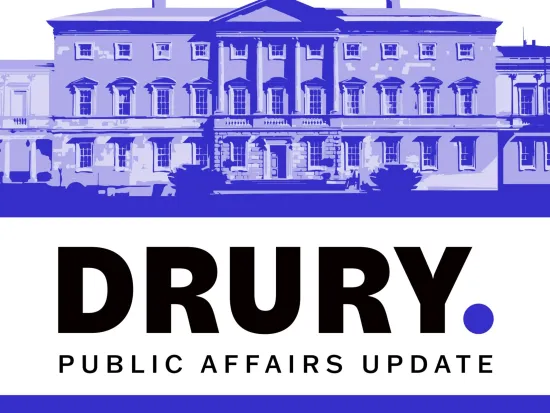Drury's Public Affairs Special Edition on Budget 2026 Key Takeaways
This year’s budget package of €9.4 billion will deliver an increase in public expenditure of just over 7% along with tax reductions equal to just over 1% of total receipts. This level of expansion has been roundly criticised by independent experts. The Irish Fiscal Advisory Council described the package as ‘not appropriate’; the Central Bank called it ‘too large’ and ‘unnecessary’; and the Economic and Social Research Institute warned that such a large package could have ‘damaging’ effects on the economy.
Meanwhile, political commentators have taken the opposite view. Over the weekend, the Sunday Times published a long article detailing how challenging line ministers found their negotiations with Paschal Donohoe and Jack Chambers. The article went on to describe Budget 2026 as ‘one of the toughest budgets in recent years’ with one ministerial bilateral labelled ‘a battlezone’. Despite the size of the budget package, no space could be found for the indexation of income tax bands and credits, nor could some key programme for Government commitments, such as reducing the cost of childcare, be progressed.
What explains this discrepancy between the size of the budget package and the Government’s inability to deliver on many of its priorities?
Part of the answer lies in the cost of honouring pre-existing policy commitments. Of the €8.1 billion expenditure package, €2 billion will be used to follow through on capital expenditure decisions made in the review of the National Development Plan in July. A significant chunk of the remainder is needed to maintain what officials call ‘Existing Levels of Service’ or ELS. The population is getting older every year, resulting in higher pension and healthcare costs, all of which need to be met from within the €8.1 billion envelope.
Another part of the answer is that the Government needs to roll-over temporary policy measures. The budget includes extensions to the VAT cut on electricity and gas, to the renters’ tax credit, the mortgage interest tax credit, and to the basic income scheme for artists. Again, all these need to come out of the budget package.
Finally, the Government needs to at least partially account for inflation. The maximum rate of the contributory pension will increase from €289.30 to €299.30. Around three quarters of this increase will be eaten up by inflation, reducing the ‘real’ impact of the policy, without reducing the cost to the Exchequer. The same goes for other social welfare payments and the cost of delivering public services.
So, given those pressures, what has the Government decided to prioritise? In the below, we set out a summary of some of the key policy measures:
KEY TAKEAWAYS
Little to nothing on income tax
No change to income tax bands or credits.
No change to USC beyond a small adjustment to the lower band to account for increase in National Minimum Wage (which will increase to €14.15 from January 1st).
Measures to tackle the housing crisis
VAT reduction for apartment construction from 13.5% to 9%.
A new corporation tax exemption for profits from cost rental housing.
An enhanced corporation tax deduction of 125% for qualifying apartment construction costs.
A geographic expansion and improvement to the Living Cities Initiative, intended to support the renovation of older housing and commercial building stock.
Extension of the rent tax credit and mortgage interest tax relief.
A new tax on derelict sites to be legislated for next year, to replace the local authority led Derelict Sites Levy. It will take effect towards the end of the decade.
VAT reductions
Reduction from 13.5% to 9% for food-based hospitality and hairdressing.
Extension of 9% rate on gas and electricity to the end of 2030.
Revenue raisers
Additional 50c excise on a packet of cigarettes.
A one-year extension to the €200m bank levy.
Business, investment and work
Increase in the R&D tax credit from 30% to 35% with an increase in the first-year payment threshold.
Funding for the establishment of a National AI Office.
Reduction in various fund taxes, such as Investment Undertaking Tax and Life Assurance Exit Tax, from 41% to 38%.
Improvement to the film tax credit for expenditure on visual effects and six-year extension to digital games tax credit.
Increase in the lifetime limit on Revised Entrepreneur Capital Gains Tax Relief from €1m to €1.5m.
Increase in the National Minimum Wage by €0.65 per hour, to €14.15.
Social Protection
€10 increase to basic social welfare rates.
Various improvements to ancillary payments for families, including increases of €8 (u12) and €16 (over 12s) in child support payments, €60 increase in Working Family Payment (WFP) income thresholds, and payment of fuel allowance to WFP recipients.
€5 increase to fuel allowance.
Increase in income disregard for carers allowance from €625 to €1,000 per week.
Confirmation that pension auto-enrolment will commence on 1st January.
Health
A record €27.4 billion allocation, an increase of €1.5 billion on 2025.
220 new acute beds, 280 community beds and 500 nursing home places.
Rollout of new pharmacy contract.
Disability
€3.8 billion allocation for disability services.
250 new residential places and increased day service places.
6,500 assessments of needs funded.
Further/Higher Education
€500 permanent reduction in student contributions
1,110 new places in key health and social care professions.
Education
Increase to capitation rates - €50 per pupil at primary and €20 per pupil at post primary.
170,000 children to be supported by school transport scheme.
Climate and Transport
The carbon tax will be increased to €71/tonne, with revenue ringfenced for social welfare, retrofitting and environmental supports for farmers.
Extension of €5,000 VRT relief for EVs for another year.
A new rate of BIK will apply to electric company cars, ranging from 6% to 15%, depending on business mileage.
Accelerated Capital Allowances on Energy Efficient Equipment and on gas vehicles will be extended for 5 years.
Agriculture
Various agri-tax reliefs will be extended, including the Farm Consolidation (Stamp Duty) relief, Farm Restructuring (CGT) relief and the Young Trained Farmer (Stamp Duty) relief.
The accelerated capital allowance for slurry storage will be extended for four more years.
Increased funding for ACRES scheme, bovine TB eradication and the National Sheep Welfare Scheme.
Culture and Sport
A €10.7m increase for Sport Ireland, €3m of which will be used for the establishment of League of Ireland football academies.
A new scheme will be established as a successor to the artists’ basic income scheme.
Public servants
Funding for up to 1,000 extra Gardaí and €19m extra for overtime, plus 200 additional civilian staff.
The budget will provide for 1,717 additional special needs assistants.
It will also fund the recruitment of 1,042 teachers, including 860 in special educational needs.





